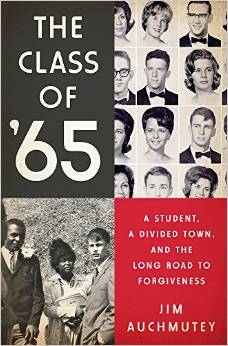Among the most anomalous corners of the South in the years after World War II was Koinonia Farm, a pacifist Christian commune deep in southwest Georgia. Led from its founding in 1942 by a Baptist minister named Clarence Jordan, Koinonia has since become celebrated as the birthplace of Habitat for Humanity.
But to say that most white people in the vicinity looked askance at the place and its residents back in the day would be a gross understatement. It was, so far as they were concerned, all about two great evils: race mixing and communism. After the arrival of the civil rights movement, the hostility turned violent.
For the children who grew up on the farm in the 1950s and 1960s, going to public school in Americus, Ga. was a nightmare of social ostracism and harassment. Now one of them is the subject of a moving book, The Class of ’65: A Student, a Divided Town, and the Long Road to Forgiveness, by a born-and-bred Georgian named Jim Auchmutey.
I got to know Jim as a colleague on the Atlanta Journal-Constitution in the late 1980s when he edited a section of the paper called, if you can believe it, Dixie Living. Among the section’s preoccupations was barbecue, which he taught me was as profound a source of sectarianism in the South as Infant Baptism and the work of the Holy Spirit.
The book is the product of an interest in Koinonia Farm that goes back to Jim’s first visit there 35 years ago. His hero is Greg Wittkamper, whose strength of character, up to and including his refusal to bend his pacifist commitment in the face of physical attack, is little short of awe-inspiring. But what’s most powerful is the admiration and remorse expressed by Wittkamper’s classmates when they wrote to persuade him to come to their 40th class reunion. One example:
Greg, you have shared the sufferings of Christ as few have. “He was despised and rejected of men.” I did not despise you. You were a young man girded with courage. I have not personally witnessed that kind of courage before of since. I don’t know how you endured, but what an example of godliness with humility you have been to me.
I have only recently discovered what Koinonia was truly about. It broke my heart that I never took the time before to discover the truth, but allowed prejudice and fear, and the things that I was told by people I thought knew the truth, to affect my thoughts and actions.
I will never again say, “How could the Holocaust have happened–how could all those Christian people in Poland and Germany have stood by and allowed it to happen?” I’ll never need to ask that again….
I can’t say now, “Well that didn’t happen in my time,” or, “I wasn’t a part of something terrible,” or, “I never lynched anybody,” or, “I wasn’t in Germany.” No, but I was present with you over a long period of time, and I never once did one thing to comfort you or reach out to you. It was cruelty.
Wittkamper did go to the reunion, and reconciliation did take place. At a time when the country seems angrier and more divided than it has been in decades, it’s good to be reminded that people can get past the anger and the division.






